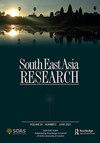电影是危险的:2010-2020年,泰国电影审查制度的十年
IF 0.9
3区 社会学
0 ASIAN STUDIES
引用次数: 0
摘要
1930年电影法案的通过标志着泰国第一次正式的电影审查措施的实施。然而,正是宪法审查制度与电影审查委员会实施的官方和广泛的审查制度相结合,创造了一个自我审查的环境,这对电影中的言论自由是最危险的。禁止电影的理由是它们对国家安全、统一、文化、宗教价值或良好道德构成威胁。在泰国,审查制度的首要框架是民族主义。即使在当代,这些民族主义的审查形式也在2008年的《国家电影和录像法》中得以实施。本文分析了对国家威胁的广泛和主观的解释,特别是“道德”一词,它不仅限于电影制作,而且延伸到策展展览和观众进入电影,这是一种受审查/评级委员会限制的艺术形式。本文章由计算机程序翻译,如有差异,请以英文原文为准。
Film is dangerous: ten years of censorship in Thailand’s cinema, 2010–2020
ABSTRACT The passing of the Cinema Act of 1930 marked the enforcement of the first official cinematic censorship measures in Thailand. However, it was constitutive censorship combined with official and expansive censorship practices enforced by the Film Censor Board that created an environment of self-censorship which is most dangerous for freedom of speech in cinema. The justification for banning films was that they constituted a threat to the nation – national security, unity, culture, religious values or good morality. In Thailand, the paramount framing of censorship is nationalism. Even in contemporary times, these nationalist formations of censorship are put into effect in the 2008 National Film and Video Act. This article analyses the expansive and subjective interpretation of national threat, especially the term of ‘morality’, which is not exclusive to film production, but extends into curatorial exhibitions and audiences’ access to cinema, an art form which is constrained by the censor/rating boards.
求助全文
通过发布文献求助,成功后即可免费获取论文全文。
去求助
来源期刊

South East Asia Research
ASIAN STUDIES-
CiteScore
1.90
自引率
0.00%
发文量
42
期刊介绍:
Published three times per year by IP Publishing on behalf of SOAS (increasing to quarterly in 2010), South East Asia Research includes papers on all aspects of South East Asia within the disciplines of archaeology, art history, economics, geography, history, language and literature, law, music, political science, social anthropology and religious studies. Papers are based on original research or field work.
 求助内容:
求助内容: 应助结果提醒方式:
应助结果提醒方式:


